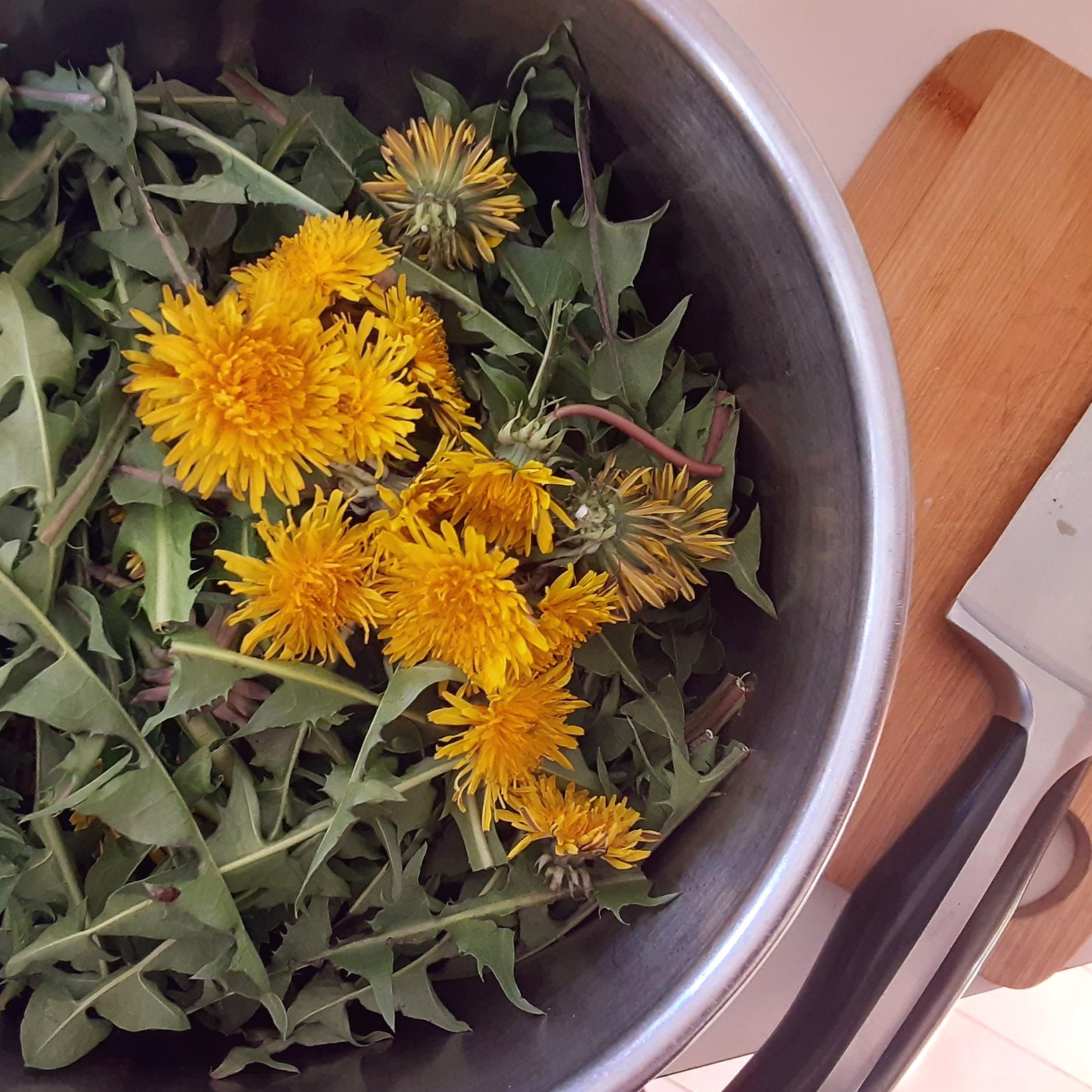Beautiful Bitters
Once upon a time, humans ate a diverse array of bitter leaves and roots from the wild plants surrounding us. We enjoyed the benefits of their vitamin and mineral content, fiber, antioxidants, prebiotics--and their bitter constituents. Our gastrointestinal system (and other systems) developed a complex relationship with bitterness over time. Today, it’s still important for healthy digestive function.
Contemporary farms cultivate greens that are mostly devoid of bitterness, catering to our preference for tender, juicy veggies. As sometimes happens with human "advancements," research suggests that we might be better off leaving some bitterness in our foods.
Ask any herbalist to describe the effects of bitterness on the body, and s/he will offer a laundry list of gastrointestinal benefits. Simply tasting bitterness on our tongue gears our bodies up for effective digestion:
Image: Dandelion greens and flowers in a metal bowl, ready to be chopped for a tincture.
It triggers salivation, which is important for digesting carbohydrates.
In the stomach, bitters stimulate the secretion of pepsin and HCl, ensuring that our "digestive fire" is stoked. Producing adequate stomach acid helps break down proteins and kill pathogens. (Excess stomach acid is generally not the root cause of heartburn.)
Digestive secretions from the pancreas and bile from the gallbladder are also revved. Bile works like detergent on dietary fats; it breaks lipids into smaller, more manageable particles for the gastrointestinal tract to handle, and allows fats to be better absorbed and metabolized.
Bitters stimulate peristalsis in the small intestine, encouraging healthy movement and excretion of waste. Improved breakdown and absorption of nutrients means we are getting more out of our food.
The benefits of bitters go deeper. In this article, Clinical herbalist Guido Mase references research on the role of bitters in healthy blood glucose levels, appetite regulation, cardiovascular health, and more.
The receptors in our body that respond to bitterness are called T2R receptors. T2R stimulation has been shown to slow down the movement of digested material through the GI tract. This slower delivery of carbohydrates to the intestines results in feeling full longer, and helps to moderate blood sugar spikes after meals.
Bitters are typically taken just before meals. This may mean adding dandelion or arugula greens to salad, drinking chicory root tea, or enjoying an aperitif/aperitivo cocktail made with homegrown yarrow bitters before dinner.
According to clinical herbalist Thomas Easley, Director of the Eclectic School of Herbal Medicine, a taste of alcohol can have a stimulating effect on digestion as well. For this reason, he likes digestive bitters in the form of alcohol-based tinctures. A good bitters formula generally contains a strong bitter or two (ex. gentian, wormwood, motherwort, blue vervain), plus nutritive bitters rich in prebiotics (ex. dandelion root and/or leaf, burdock root, chicory root). I like adding aromatic bitters, such as orange peel, angelica, yarrow or fennel.
Precautions?
Bitters are good for nearly everyone. Our bodies are "designed" for them. The beautiful thing about bitters is that a very small dose will do the job. 15 drops of a bitters tincture on the tongue isn't enough to be a concern as far as herb-drug interactions, for the vast majority of folks. (Talk to a practitioner to confirm this for your body and medication.)
Individuals who might be advised against bitters include those with extremely dry constitutions, or those with serious liver diseases who are working on nourishing (not stimulating) the liver, and regenerating liver cells.
Reference:
Mase, Guido. "Herbal bitters: their role in appetite regulation, blood glucose management, and obesity." 2015. www.americanherbalistsguild.com/sites/default/files/bitters-mase-2015_1.pdf

